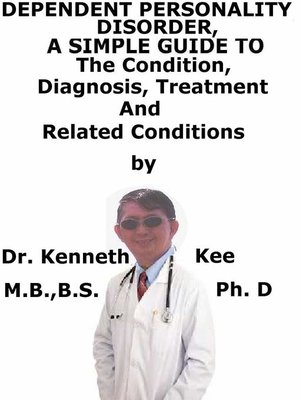Dependent Personality Disorder, a Simple Guide to the Condition, Diagnosis, Treatment and Related Conditions
ebook
By Kenneth Kee

Sign up to save your library
With an OverDrive account, you can save your favorite libraries for at-a-glance information about availability. Find out more about OverDrive accounts.
Find this title in Libby, the library reading app by OverDrive.



Search for a digital library with this title
Title found at these libraries:
| Library Name | Distance |
|---|---|
| Loading... |
This book describes Dependent Personality Disorder, Diagnosis and Treatment and Related Diseases
Everything was everyone else's fault, and they are perpetual dependent victims.
What is Dependent Personality Disorder?
Dependent personality disorder (DPD) is a mental medical disorder in which people depend too much on others to meet their emotional and physical requirements.
DPD is an anxious personality disorder featured by an incapability to be alone.
People with DPD have symptoms of anxiety when they are not around others.
They depend on other people for relief, reassurance, guidance, and support.
People who do not have this condition occasionally have feelings of insecurity.
The difference is that people with DPD require reassurance from others to function.
Dependent personality disorder is one of the most often diagnosed personality disorders.
It happens equally in men and women
People with this disorder normally first reveal these signs in early to mid-adulthood.
It normally becomes apparent in young adulthood or later as important adult relationships form.
A disorder must fall into one of these personalities to be classified as a personality disorder:
1. Cluster A: odd or eccentric behavior
2. Cluster B: emotional or erratic behavior
3. Cluster C: anxious, nervous behavior
Dependent personality disorder belongs to cluster C.
Signs of this disorder are:
1. Behaving submissively
2. Relying on friends or family for decision-making
3. Needing repeated reassurance
4. Being easily hurt by disapproval
5. Feeling isolated and nervous when alone
6. Fearing rejection
7. Being overly sensitivity to criticism
8. Being unable to be alone
9. Having a tendency to be naive
10. Fearing abandonment
People with DPD may need continuous reassurance.
They can become distressed when relationships and friendships are detached.
When left alone, a person with DPD may feel:
1. Nervousness
2. Anxiety
3. Panic attacks
4. Fear
5. Hopelessness
Some of these symptoms are similar for people with anxiety disorders.
People with medical disorders such as depression or menopause may also feel some of these symptoms.
It is not known what induces people to develop DPD.
Doctors mention both biological and developmental factors.
The causes of dependent personality disorder are not known.
The disorder normally starts in childhood.
It is one of the most frequent personality disorders.
It is equally frequent in men and women.
While the exact cause of DPD is not known, it most likely is a combination of biological, developmental, temperamental, and psychological factors.
Some doctors believe an authoritarian or overprotective parenting style can cause the development of dependent personality traits in people who are vulnerable to the disorder.
Some risk factors that might contribute to the development of this disorder are:
1. Having a history of neglect
2. Having an abusive upbringing
3. Being in a long-term, abusive relationship
4. Having overprotective or authoritarian parents
5. Having a family history of anxiety disorders
People with DPD become psychologically over dependent on other people and spend great effort trying to please others.
People with DPD are likely to display needy, passive, and clinging behavior
They have a fear of separation.
People with DPD may need continuous reassurance.
They can become distressed when relationships and friendships are detached.
Persons with DPD have...







